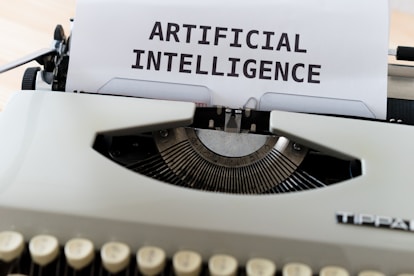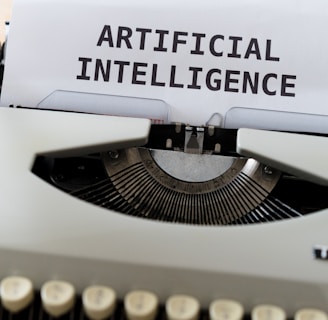AI and the Ghostwriter: Collaborating with Machine Learning
Bibliotheca Exotica
5 min read


In the domain of ghostwriting, the advent of AI technology marks a transformative era. Ghostwriters, known for their ability to craft narratives with smooth eloquence, now find an intriguing collaborator in machine learning. This synergy between human creativity and AI’s computational power is reshaping how ghostwriters approach their craft.
Adopting AI in Ghostwriting
At the core of ghostwriting lies the art of storytelling, an inherently human attribute. However, AI’s burgeoning role is not to supplant this creativity but to augment it. Ghostwriters can now utilize AI for meticulous research, generating a reservoir of information that was previously time-consuming to accumulate. This integration significantly enhances efficiency, allowing writers to dive deeper into subjects with ease.
AI-Powered Research and Brainstorming
For ghostwriters, the initial stages of a project often involve extensive research and brainstorming. AI tools adeptly sift through vast databases, procuring relevant data, trends, and insights. This process not only speeds up research but also uncovers novel angles and perspectives, enriching the ghostwriter’s arsenal. Furthermore, AI can simulate brainstorming sessions, suggesting ideas and themes that might not immediately occur to a human mind.
Drafting with AI
The drafting phase witnesses the most direct collaboration between ghostwriters and AI. Here, AI assists in laying down a basic framework for the story or article. Ghostwriters can then infuse their unique style and narrative flair into this scaffold. This partnership ensures that the final piece resonates with the intended audience while retaining the authenticity of the ghostwriter’s voice.
Maintaining the Human Touch
Despite AI’s proficiency in handling data and patterns, it lacks the nuanced understanding of human emotions and experiences. This is where the ghostwriter’s role becomes pivotal. They imbue the narrative with empathy, context, and subtlety—elements that AI alone cannot replicate. The ghostwriter’s expertise in forging stories that connect with readers on a personal level remains irreplaceable.
The Future of Ghostwriting and AI
As AI technology continues to evolve, its role in ghostwriting is bound to expand. However, this does not diminish the ghostwriter’s importance. Instead, it presents an opportunity for these skilled writers to explore new horizons in storytelling, backed by the robust analytical capabilities of AI.
Noes
Now, let’s dive into some less-explored dimensions of this partnership. This nuanced analysis will also illuminate the potential drawbacks for genuine writers navigating this evolving landscape.
Expanding Horizons: Unconventional AI Applications in Ghostwriting
· Emotional Analysis and Tone Setting: AI can analyze vast swathes of text to identify emotional patterns and trends. This can guide ghostwriters in setting the right tone for their audience, especially when handling complex subjects like historical fiction or philosophy. By understanding what resonates emotionally with readers, ghostwriters can craft more impactful narratives.
· Cultural Sensitivity Checks: With AI’s ability to process and learn from diverse datasets, it can assist writers in ensuring cultural sensitivity and accuracy. This is particularly crucial in historical realism, where authenticity and respect for cultural nuances are paramount.
· Personalized Storytelling: AI algorithms can analyze reader preferences and trends, enabling ghostwriters to tailor their content to specific audiences. This personalized approach can significantly increase reader engagement, especially in digital platforms where content consumption is often driven by personalization algorithms.
· Innovative Structures and Formats: AI’s capability to process and analyze different narrative structures can inspire ghostwriters to experiment with unconventional formats. This could lead to a renaissance in storytelling, breaking free from traditional linear narratives and exploring more dynamic and interactive formats.
Potential Downsides for Authentic Writers
· Overreliance on AI: There’s a risk that ghostwriters might become overly dependent on AI for creativity and originality. This overreliance could stifle their innate creativity and lead to a homogenization of writing styles, as AI tends to generate content based on existing patterns and data.
· Dilution of Emotional Depth: While AI can assist in setting emotional tones, it lacks the intrinsic human capacity for empathy and deep emotional understanding. This gap can lead to narratives that, while structurally sound, may lack the emotional depth and subtlety that only a human writer can provide.
· Ethical Concerns and Authenticity: The use of AI in ghostwriting raises questions about authenticity and intellectual property. There’s a fine line between using AI as a tool and passing AI-generated content as entirely human-created. This grey area poses ethical dilemmas for writers committed to maintaining authenticity in their work.
· Market Saturation and Value Dilution: As AI makes it easier to produce written content, the market could become saturated with AI-assisted or AI-generated works. This could potentially devalue the unique skills of genuine writers, making it harder for them to stand out and be adequately compensated for their talents.
It Gets Worse
Venturing into the more obscure and seldom-discussed hazards that ghostwriters face in the age of AI, we uncover a plethora of other challenges that are not immediately apparent but hold significant implications for the craft of ghostwriting.
1. The Erosion of Writing Skills:
In a scenario where AI handles a substantial part of the creative process, there’s a looming risk of skill atrophy among ghostwriters. The nuanced art of crafting a narrative, developing characters, and maintaining a consistent tone can diminish if these skills are underutilized. Over time, this could lead to a generation of writers who are more editors than creators, potentially leading to a decline in overall writing quality.
2. The Echo Chamber Effect:
AI algorithms, designed to learn from existing data, could inadvertently create echo chambers. They might generate content that reflects prevailing trends and popular opinions, ignoring minority viewpoints and unconventional ideas. For ghostwriters, this means a potential narrowing of creative horizons and a risk of producing work that lacks originality or fails to challenge the status quo.
3. Loss of Anonymity and Privacy:
As AI tools become more integrated into the writing process, they collect vast amounts of data on writing styles and preferences. This data, if not managed with strict confidentiality, could inadvertently reveal the identities of ghostwriters, especially those who work on sensitive or controversial topics. The loss of anonymity can be a significant hazard, potentially exposing writers to unwanted attention or compromising their ability to work on certain projects.
4. Algorithmic Bias and Stereotyping:
AI is not immune to biases present in its training data. For ghostwriters, this means there’s a risk of perpetuating stereotypes and biases through AI-generated content. This is particularly concerning in genres like historical fiction, where accuracy and sensitivity to historical contexts are crucial. Unchecked, this could lead to a reinforcement of harmful stereotypes and a misrepresentation of history.
5. The Challenge of Emotional Nuance:
AI’s limitations in understanding and replicating human emotions pose a unique challenge. Ghostwriters often need to convey subtle emotional nuances and complex psychological landscapes in their writing. AI’s current inability to fully grasp these subtleties can lead to narratives that feel shallow or emotionally disconnected, undermining the impact of the story.
6. Intellectual Property Ambiguity:
The increasing use of AI in writing blurs the lines of intellectual property. Determining the ownership of content that is a collaborative effort between a human ghostwriter and an AI tool can become a legal and ethical maze. This ambiguity poses a significant hazard for ghostwriters, especially in a profession where credit and ownership are already complex issues.
7. The Psychological Impact of AI Collaboration:
Lastly, the psychological impact on ghostwriters collaborating with AI is an area that warrants attention. The shift from being the sole creator to a co-creator with an AI can alter a writer’s perception of their skills and value. This change can lead to a range of emotional responses, from diminished self-esteem to an existential questioning of their role as writers in an AI-dominated landscape.
To conclude everything we've said thus far, the fusion of AI with ghostwriting heralds a new era of innovation and efficiency, presenting a spectrum of tools for enhancing the writing process. However, this intertwining also unveils a myriad of complex and often overlooked hazards. It’s crucial for writers to maintain an astute awareness of these potential pitfalls. Achieving a delicate equilibrium, where AI’s analytical prowess is pleasantly balanced with the irreplaceable human elements of empathy, creativity, and ethical judgment, becomes paramount. This synergy is essential for harnessing the best of both domains in the continuously evolving art of storytelling. It’s also vital to ensure that AI remains an empowering collaborator, enriching rather than diminishing the craft and profession of ghostwriting. This mindful approach will determine how effectively we can blend the strengths of AI with the nuanced skills of human writers, steering clear of reducing AI to a detrimental force in the realm of narrative creation.

